 26. ON THE EDGE, Frank Solivan & Dirty Kitchen (Compass Records)– It was back in 2010 when first we heard from Frank Solivan & Dirty Kitchen on their self-titled debut album (Solivan himself had recorded two solo albums prior to forming Dirty Kitchen). So impressive was that album in every respect that the group earned Artist on the Verge honors in the February 2011 issue of TheBluegrassSpecial.com; in 2012 Solivan and band received an IBMA nomination as Emerging Artist of the Year. Now the group is back, signed to Nashville’s Compass Records and surfacing anew with the Dirty Kitchen lineup intact and supplemented on this outing by dobro master Rob Ickes; Solivan’s coustin Megan McCormick, a fine singer-songwriter in her own right; and Tim O’Brien. The appealing qualities that made the 2010 album so captivating are strengthened here, namely the high level of songwriting, Solivan’s smooth, affecting tenor, the group’s tight, evocative harmonies, and most certainly the high level of musicianship. In short, an inspired effort, this On the Edge, building as it does on the strengths of the previous album and giving fans reason enough to believe Frank Solivan & Dirty Kitchen are settling into a long-term run as productive as it will be influential. They’ve got it all, including momentum. –-Follow this link to the Deep Roots review of On the Edge.
26. ON THE EDGE, Frank Solivan & Dirty Kitchen (Compass Records)– It was back in 2010 when first we heard from Frank Solivan & Dirty Kitchen on their self-titled debut album (Solivan himself had recorded two solo albums prior to forming Dirty Kitchen). So impressive was that album in every respect that the group earned Artist on the Verge honors in the February 2011 issue of TheBluegrassSpecial.com; in 2012 Solivan and band received an IBMA nomination as Emerging Artist of the Year. Now the group is back, signed to Nashville’s Compass Records and surfacing anew with the Dirty Kitchen lineup intact and supplemented on this outing by dobro master Rob Ickes; Solivan’s coustin Megan McCormick, a fine singer-songwriter in her own right; and Tim O’Brien. The appealing qualities that made the 2010 album so captivating are strengthened here, namely the high level of songwriting, Solivan’s smooth, affecting tenor, the group’s tight, evocative harmonies, and most certainly the high level of musicianship. In short, an inspired effort, this On the Edge, building as it does on the strengths of the previous album and giving fans reason enough to believe Frank Solivan & Dirty Kitchen are settling into a long-term run as productive as it will be influential. They’ve got it all, including momentum. –-Follow this link to the Deep Roots review of On the Edge.
‘On the Edge of Letting Go,’ co-written by Frank Solivan and Jon Weisberger, examines the corrosive effects mental illness has on a relationship. This live version was performed at Nashville’s Station Inn on July 6, 3012.
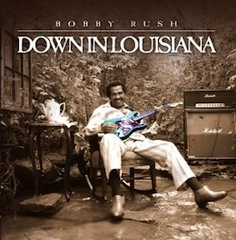 27. DOWN IN LOUISIANA, Bobby Rush (Deep Rush Records/Thirty Tigers)–Experience counts for a lot in the blues, and 77-year-old Bobby Rush has a lot of it under his belt. This is a Louisiana man who grew up in Chicago and was mentored by the likes of Muddy Waters, Howlin’ Wolf and Elmore James before he kicked off his own professional career in the ‘60s. Working with a tight, frisky quartet on his new album, Down in Louisiana, Rush brings the full weight of his life’s journey to bear on mostly original songs, and sings with renewed vigor, defying his age and proving himself still formidable after all these years. It was only two years ago that his Show You a Good Time won Best Soul Blues Album of the Year at the Blues Music Awards, and not only has he not slipped an inch since then, he’s even more imposing this time out. Follow this link to the Deep Roots review of Down in Louisiana.
27. DOWN IN LOUISIANA, Bobby Rush (Deep Rush Records/Thirty Tigers)–Experience counts for a lot in the blues, and 77-year-old Bobby Rush has a lot of it under his belt. This is a Louisiana man who grew up in Chicago and was mentored by the likes of Muddy Waters, Howlin’ Wolf and Elmore James before he kicked off his own professional career in the ‘60s. Working with a tight, frisky quartet on his new album, Down in Louisiana, Rush brings the full weight of his life’s journey to bear on mostly original songs, and sings with renewed vigor, defying his age and proving himself still formidable after all these years. It was only two years ago that his Show You a Good Time won Best Soul Blues Album of the Year at the Blues Music Awards, and not only has he not slipped an inch since then, he’s even more imposing this time out. Follow this link to the Deep Roots review of Down in Louisiana.
From Down in Louisiana, Bobby Rush performs ‘Tight Money’ a thumping communiqué from the poor side of town that becomes a commentary on a society pricing out part of its population.
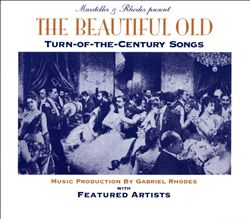 28. THE BEAUTIFUL OLD, Various Artists (Doubloon Records)– The Beautiful Old, on the other hand, offers the haunting neo-Victorian language of early American popular songs in its 19 offerings ranging from 1805’s “The Last Rose of Summer,” a wistful instrumental version of a poem by Thomas Moore (friend of Shelley and Byron) originally set to music by Sir John Stevenson and since interpreted by everyone from Beethoven to the Grateful Dead, to two tunes from 1918, obviously well after the Civil War ended. What it has in common with Home Sweet Home is the window it offers into a lost world of civil discourse, graceful, beckoning melodies, and genteel lyricism reflecting the rise of a distinctly American voice and temperament (with the post-Civil War diminishing of the Anglo influence). It’s a wondrous moment, even more wondrous in not relying on a single Stephen Foster song to heighten its impact. The brainchild of producer Peter Marsteller and heralded multi-instrumentalist Gabriel Rhodes (who, interestingly, helped produce the 2005 Grammy winning Best Traditional Folk Album, Beautiful Dreamer: The Songs of Stephen Foster, and whose mother, singer-songwriter Kimmie Rhodes, is one of the album’s stars), The Beautiful Old was a year-plus in the planning but the wait was worthwhile, because it seems all the right pieces are in the right places here. Clearly one of the smartest moves was to bring in The Band’s Garth Hudson on accordion and keyboards, then sit back and let him masterfully steer various reed and string ensembles to a higher artistic plane. Follow this link to the Deep Roots review of The Beautiful Old.
28. THE BEAUTIFUL OLD, Various Artists (Doubloon Records)– The Beautiful Old, on the other hand, offers the haunting neo-Victorian language of early American popular songs in its 19 offerings ranging from 1805’s “The Last Rose of Summer,” a wistful instrumental version of a poem by Thomas Moore (friend of Shelley and Byron) originally set to music by Sir John Stevenson and since interpreted by everyone from Beethoven to the Grateful Dead, to two tunes from 1918, obviously well after the Civil War ended. What it has in common with Home Sweet Home is the window it offers into a lost world of civil discourse, graceful, beckoning melodies, and genteel lyricism reflecting the rise of a distinctly American voice and temperament (with the post-Civil War diminishing of the Anglo influence). It’s a wondrous moment, even more wondrous in not relying on a single Stephen Foster song to heighten its impact. The brainchild of producer Peter Marsteller and heralded multi-instrumentalist Gabriel Rhodes (who, interestingly, helped produce the 2005 Grammy winning Best Traditional Folk Album, Beautiful Dreamer: The Songs of Stephen Foster, and whose mother, singer-songwriter Kimmie Rhodes, is one of the album’s stars), The Beautiful Old was a year-plus in the planning but the wait was worthwhile, because it seems all the right pieces are in the right places here. Clearly one of the smartest moves was to bring in The Band’s Garth Hudson on accordion and keyboards, then sit back and let him masterfully steer various reed and string ensembles to a higher artistic plane. Follow this link to the Deep Roots review of The Beautiful Old.
Promotional video for The Beautiful Old. Includes snippets of ‘The Band Played On’ (lead vocal: Richard Thompson), ‘The Flying Trapeze’ (Graham Parker); ‘Beautiful Ohio’ (Kim Richey, Garth Hudson on piano); ‘After the Ball’ (Dave Davies); ‘Silver Dagger’ (Julie Goodnight, with Richard Bowden on fiddle, Gabriel Rhodes on guitar).
 29. SARAWOGA, Oliver ‘Tuku’ Mtukudzi (Oliver ‘Tuku’ Mtukudzi)–Affectionately called “Tuku” by fans worldwide, Oliver ‘Tuku’ Mtukudzi has weathered storms with his sharp observations and unwavering emphasis on the basic human experiences that unite us all: childhood and aging, respect and hope, women’s rights and AIDS, community and connection. “My music and art come from the everyday living I do,” Mtukudzi reflects. “I write what I see around me. When I see something, I have something real to talk about. If there is something to talk about, there’s something to sing about, and there’s always something new to talk about.” Tuku’s latest album Sarawoga proves that the venerable artist still has plenty to say. With a career that spans the birth of his native Zimbabwe and the advent of both Afro-pop and the global love affair with African roots music, Tuku’s quicksilver guitar work, keen ear for melody and evocative voice have earned him intense adulation at home. His organic, savvy mix of traditional ways, pan-African influences, and cosmopolitan pop forms became widely known as Tuku Music. Follow this link to the Deep Roots interview with Oliver ‘Tuku’ Mtukudzi, ‘Welcome Has No Boundaries.’
29. SARAWOGA, Oliver ‘Tuku’ Mtukudzi (Oliver ‘Tuku’ Mtukudzi)–Affectionately called “Tuku” by fans worldwide, Oliver ‘Tuku’ Mtukudzi has weathered storms with his sharp observations and unwavering emphasis on the basic human experiences that unite us all: childhood and aging, respect and hope, women’s rights and AIDS, community and connection. “My music and art come from the everyday living I do,” Mtukudzi reflects. “I write what I see around me. When I see something, I have something real to talk about. If there is something to talk about, there’s something to sing about, and there’s always something new to talk about.” Tuku’s latest album Sarawoga proves that the venerable artist still has plenty to say. With a career that spans the birth of his native Zimbabwe and the advent of both Afro-pop and the global love affair with African roots music, Tuku’s quicksilver guitar work, keen ear for melody and evocative voice have earned him intense adulation at home. His organic, savvy mix of traditional ways, pan-African influences, and cosmopolitan pop forms became widely known as Tuku Music. Follow this link to the Deep Roots interview with Oliver ‘Tuku’ Mtukudzi, ‘Welcome Has No Boundaries.’
Oliver ‘Tuku’ Mtukudzi, ‘Ronga Donda,’ a meditation on Tuku’s late son, Sam Mtukudz, who died in a car accident in March 2010. From the album Sarawoga.
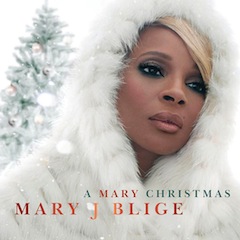 30. A MARY CHRISTMAS, Mary J. Blige (Verve)– In a promotional video, Ms. Blige cites “timing” as the reason for A Mary Christmas coming out now, meaning it was something she had always wanted to do but had not moved on until producer David Foster broached the subject. But performances as intimate as these are a reflection of a different kind of timing relating to her maturation–-and not only as an artist. A Mary Christmas—that her name, not Merry, is in the title is quite revealing—is about an artist finding and expressing some part of her humanity in the songs’ sentiments. She says she wanted to “put some love and joy in the universe, which is, you know, what we need.” Whatever issues she may be tackling offstage, it sounds like she’s tapped into a rich well of love and joy within her to a degree she never could before. Thus the “timing” of which she speaks. Indeed, it’s a Mary Christmas, and it’s every bit as personal as the title suggests. Even if the personal growth she’s spoken of remains nascent, there’s no doubting, or faking, the feeling she puts in her music—those millions of fans that have been buying her albums since her 1992 debut haven’t been buying her celebrity; they’re moved by a voice with deep roots in classic soul, gospel and R&B and the intense personal commitment she makes to her lyrics. These attributes are in abundant evidence on A Mary Christmas, which is nothing less than far and away the best new Christmas album of a strong 2013 season. Follow this link to the Deep Roots review of A Mary Christmas.
30. A MARY CHRISTMAS, Mary J. Blige (Verve)– In a promotional video, Ms. Blige cites “timing” as the reason for A Mary Christmas coming out now, meaning it was something she had always wanted to do but had not moved on until producer David Foster broached the subject. But performances as intimate as these are a reflection of a different kind of timing relating to her maturation–-and not only as an artist. A Mary Christmas—that her name, not Merry, is in the title is quite revealing—is about an artist finding and expressing some part of her humanity in the songs’ sentiments. She says she wanted to “put some love and joy in the universe, which is, you know, what we need.” Whatever issues she may be tackling offstage, it sounds like she’s tapped into a rich well of love and joy within her to a degree she never could before. Thus the “timing” of which she speaks. Indeed, it’s a Mary Christmas, and it’s every bit as personal as the title suggests. Even if the personal growth she’s spoken of remains nascent, there’s no doubting, or faking, the feeling she puts in her music—those millions of fans that have been buying her albums since her 1992 debut haven’t been buying her celebrity; they’re moved by a voice with deep roots in classic soul, gospel and R&B and the intense personal commitment she makes to her lyrics. These attributes are in abundant evidence on A Mary Christmas, which is nothing less than far and away the best new Christmas album of a strong 2013 season. Follow this link to the Deep Roots review of A Mary Christmas.
Mary J. Blige, ‘Mary Did You Know,’ from A Mary Christmas.
 31. BEFORE THE WORLD WAS MADE, Brennen Leigh & Noel McKay (1-2-3-4-GO!)—Brennan Leigh & Noel McKay not only do not look like they stepped out of a Civil War daguerreotype, they don’t sound like they just stepped through a time warp that brought them from an Appalachian Mountains holler in the 1930s into 2013. With Gurf Morlix producing and playing multiple instruments, and surrounded by a band that includes Lisa Pankratz on drums, Brad Fordham on upright and electric bass and cameos by fiddler Beth Chrisman and pianist T Jarrod Bonta (in addition to Leigh’s guitars and mandolin and McKay’s guitars and ukulele), the duo is deeply embedded in an ambiance harkening to mainstream country from the late ‘50s through the ‘60s (they might even edge into the early ‘70s)—polished enough for radio at the time but with a smidgen of the live rawness (especially in the bright vocals far forward in the mix) of a home recording. If any other duo so convincingly evokes this era, I haven’t heard them. Follow this link to the Deep Roots review of Before the World Was Made.
31. BEFORE THE WORLD WAS MADE, Brennen Leigh & Noel McKay (1-2-3-4-GO!)—Brennan Leigh & Noel McKay not only do not look like they stepped out of a Civil War daguerreotype, they don’t sound like they just stepped through a time warp that brought them from an Appalachian Mountains holler in the 1930s into 2013. With Gurf Morlix producing and playing multiple instruments, and surrounded by a band that includes Lisa Pankratz on drums, Brad Fordham on upright and electric bass and cameos by fiddler Beth Chrisman and pianist T Jarrod Bonta (in addition to Leigh’s guitars and mandolin and McKay’s guitars and ukulele), the duo is deeply embedded in an ambiance harkening to mainstream country from the late ‘50s through the ‘60s (they might even edge into the early ‘70s)—polished enough for radio at the time but with a smidgen of the live rawness (especially in the bright vocals far forward in the mix) of a home recording. If any other duo so convincingly evokes this era, I haven’t heard them. Follow this link to the Deep Roots review of Before the World Was Made.
Brennen Leigh & Noel McKay, ‘Breaking Up is Easy,’ live at the Cinema Bar, Culver City, CA, June 22, 2010. Posted at YouTube by New Crow.
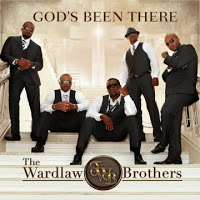 32. GOD’S BEEN THERE, The Wardlaw Brothers (TWB Records/New Day Christian Distribution)– If Boyz II Men forsook R&B for gospel, they would sound like the Wardlaw Brothers. This contemporary gospel quintet from Lyons, Georgia, blends the finger-popping rhythms of Boyz II Men, the breathy harmonies of Take 6 and the pop sensibility of the Winans to create a style that falls somewhere between quartet and contemporary gospel group. God’s Been There is an apt title for the Wardlaw Brothers’ new CD, the first to be nationally distributed on their new label, TWB Records. The lyrics to several of the baker’s dozen selections, all of which link to biblical passages, glorify God as father to the fatherless, friend to the friendless, and the one true light in the midst of darkness. Follow this link to the Deep Roots review of God’s Been There.
32. GOD’S BEEN THERE, The Wardlaw Brothers (TWB Records/New Day Christian Distribution)– If Boyz II Men forsook R&B for gospel, they would sound like the Wardlaw Brothers. This contemporary gospel quintet from Lyons, Georgia, blends the finger-popping rhythms of Boyz II Men, the breathy harmonies of Take 6 and the pop sensibility of the Winans to create a style that falls somewhere between quartet and contemporary gospel group. God’s Been There is an apt title for the Wardlaw Brothers’ new CD, the first to be nationally distributed on their new label, TWB Records. The lyrics to several of the baker’s dozen selections, all of which link to biblical passages, glorify God as father to the fatherless, friend to the friendless, and the one true light in the midst of darkness. Follow this link to the Deep Roots review of God’s Been There.
[spacer height=”10px”]
The Wardlaw Brothers, ‘Somewhere Listening,’ from the album God’s Been There
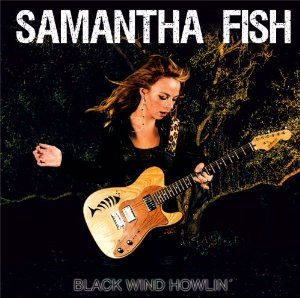 33. (tie) BLACK WIND HOWLIN’, Samantha Fish (Ruf Records)/TURQUOISE, Devon Allman (Ruf Records)— Many are the noteworthy attributes to consider in discussing Samantha Fish’s sophomore effort, Black Wind Howlin’, one of which, not by any means the least important, is her sidestepping the second album jinx by tackling every song with near-frightening intensity. The first sound we hear on the album opening firestorm titled “Miles to Go” is drummer Yonrico Scott’s rat-a-tat-tat volley preceding a mercilessly slashing guitar onslaught, a razor-edged attack on a track redolent with ZZ Top-like fury. When Ms. Fish enters vocally, listeners familiar with her debut album (which was the main topic of conversation in one of the first in-depth profiles of her, published in TheBluegrassSpecial.com’s September 2011 issue) will notice immediately the degree to which, only two years after her debut, her voice is not only stronger but more assured, and more colorful. This turns out to be true of her every performance—impressive, to say the least. The X factor is producer Mike Zito, an ace guitarist who has had a very big year-plus, what with his roles in Royal Southern Brotherhood, in his own solo career and in producing other artists for the Ruf label. Follow this link to the Deep Roots review of Black Wind Howlin’.
33. (tie) BLACK WIND HOWLIN’, Samantha Fish (Ruf Records)/TURQUOISE, Devon Allman (Ruf Records)— Many are the noteworthy attributes to consider in discussing Samantha Fish’s sophomore effort, Black Wind Howlin’, one of which, not by any means the least important, is her sidestepping the second album jinx by tackling every song with near-frightening intensity. The first sound we hear on the album opening firestorm titled “Miles to Go” is drummer Yonrico Scott’s rat-a-tat-tat volley preceding a mercilessly slashing guitar onslaught, a razor-edged attack on a track redolent with ZZ Top-like fury. When Ms. Fish enters vocally, listeners familiar with her debut album (which was the main topic of conversation in one of the first in-depth profiles of her, published in TheBluegrassSpecial.com’s September 2011 issue) will notice immediately the degree to which, only two years after her debut, her voice is not only stronger but more assured, and more colorful. This turns out to be true of her every performance—impressive, to say the least. The X factor is producer Mike Zito, an ace guitarist who has had a very big year-plus, what with his roles in Royal Southern Brotherhood, in his own solo career and in producing other artists for the Ruf label. Follow this link to the Deep Roots review of Black Wind Howlin’.
Samantha Fish (and Royal Southern Brotherhood bassist Charlie Wooton, who plays on the album) discusses Black Wind Howlin’: ‘To me it’s more me than the last record…’
 The surname is oh-so-familiar, and will doubtless cause some to wince at the thought of yet another offspring of the famous entering the same field as those who brought him into this world and proving to have lesser gifts than his parent(s). In the case of Devon Allman, those concerns are unfounded. Certain attributes must be born in the blood—an unerring feel for country blues, a certain rocking spirit, and a taste for messing with conventional approaches that expand tradition while simultaneously embracing it. Right here it should be noted that he did not even meet his father until he was in his teens. An instant bond formed, but it’s not like he spent his childhood following Gregg around, which may account (or maybe not) for some insinuations of Gregg’s roots in Devon’s music, but the end result being an artist claiming his own turf while not disowning his celebrated surname.
The surname is oh-so-familiar, and will doubtless cause some to wince at the thought of yet another offspring of the famous entering the same field as those who brought him into this world and proving to have lesser gifts than his parent(s). In the case of Devon Allman, those concerns are unfounded. Certain attributes must be born in the blood—an unerring feel for country blues, a certain rocking spirit, and a taste for messing with conventional approaches that expand tradition while simultaneously embracing it. Right here it should be noted that he did not even meet his father until he was in his teens. An instant bond formed, but it’s not like he spent his childhood following Gregg around, which may account (or maybe not) for some insinuations of Gregg’s roots in Devon’s music, but the end result being an artist claiming his own turf while not disowning his celebrated surname.
Devon Allman, ‘Strategy,’ from Turquoise
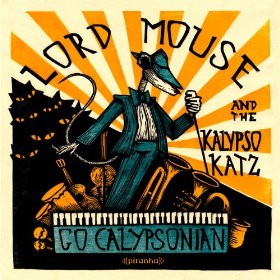 34. GO CALYSPONIAN, Lord Mouse and the Kalypso Katz (Piranha Musik)–Vintage calypso—the beloved Caribbean sounds of the early 20th-century—is alive and well and thriving in Berlin. The seventeen-member strong, multinational, wildly effusive, charmingly quirky Lord Mouse and the Kalypso Katz packs the city’s bars and stages with swaying beats, hot horns, bold lyrics, and a bevy of dapper, rakish suits and bathing-beauty chorus of singing, dancing damsels. After four years of wooing crowds around Western Europe, they have finally released their call for the world to Go Calypsonian (Piranha Musik). As the album reveals, the band may break into a ridiculously catchy Soviet cartoon ditty (“Chunga Changa,” courtesy of Russian bassist General Confusion), into a sweet homage to the abdication of King Edward (the classic calypso song, “Love, Love Alone”), or do its damnedest to make booties shimmy (“Calypso Hipshake”). Follow this link to the Deep Roots feature on Lord Mouse and the Kalypso Katz.
34. GO CALYSPONIAN, Lord Mouse and the Kalypso Katz (Piranha Musik)–Vintage calypso—the beloved Caribbean sounds of the early 20th-century—is alive and well and thriving in Berlin. The seventeen-member strong, multinational, wildly effusive, charmingly quirky Lord Mouse and the Kalypso Katz packs the city’s bars and stages with swaying beats, hot horns, bold lyrics, and a bevy of dapper, rakish suits and bathing-beauty chorus of singing, dancing damsels. After four years of wooing crowds around Western Europe, they have finally released their call for the world to Go Calypsonian (Piranha Musik). As the album reveals, the band may break into a ridiculously catchy Soviet cartoon ditty (“Chunga Changa,” courtesy of Russian bassist General Confusion), into a sweet homage to the abdication of King Edward (the classic calypso song, “Love, Love Alone”), or do its damnedest to make booties shimmy (“Calypso Hipshake”). Follow this link to the Deep Roots feature on Lord Mouse and the Kalypso Katz.
[spacer height=”20px”]
Doing their damndest to make booties shimmy: Lord Mouse and the Kalypso Katz, ‘Calypso Hipshake,’ from Go Calypsonian
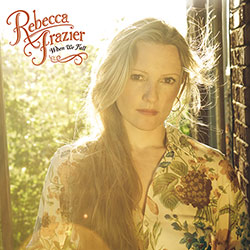 35. WHEN WE FALL, Rebecca Frazier (Amtoco Records)–On first glance the washed-out shot of Rebecca Frazier on the cover of her new album When We Fall seems like a mistake, all faded autumnal colors complementing the artist’s dour, faraway expression. Study it closer, however, and its severity softens when you notice the halo effect around Frazier’s head and how she seems not a static, sorrowful figure but rather someone walking into light, almost out of another dimension, in fact, and the eyes that first impressed as being weepy now appear set, as do her thin lips, in a determined, steely gaze radiating strength. So it is that When We Fall, born in tragedy, becomes a stirring, at times high-spirited, celebration of life, love and spiritual reconciliation. In November 2010 her youngest of two sons, Charlie, died; her response to this unspeakable tragedy, the worst a parent can endure, was to turn to her art: “I knew I could rely on creativity and hope in order to heal,” she writes in her brief liner notes. A chance meeting with producer Brent Truitt (whose resume includes work with the Dixie Chicks and Alison Krauss) gave rise to their discussing an album project. Frazier and her husband and musical collaborator John continued writing and, well, doing other things. Soon there was a batch of new original songs, then the onset of sessions for the new album, and finally, a new addition to the Frazier family, a daughter, Cora. That When We Fall, despite its sober title, is infused with so much life, honors the Fraziers’ resilience, their new daughter and the spirit of their departed son. Follow this link to the Deep Roots review of When We Fall.
35. WHEN WE FALL, Rebecca Frazier (Amtoco Records)–On first glance the washed-out shot of Rebecca Frazier on the cover of her new album When We Fall seems like a mistake, all faded autumnal colors complementing the artist’s dour, faraway expression. Study it closer, however, and its severity softens when you notice the halo effect around Frazier’s head and how she seems not a static, sorrowful figure but rather someone walking into light, almost out of another dimension, in fact, and the eyes that first impressed as being weepy now appear set, as do her thin lips, in a determined, steely gaze radiating strength. So it is that When We Fall, born in tragedy, becomes a stirring, at times high-spirited, celebration of life, love and spiritual reconciliation. In November 2010 her youngest of two sons, Charlie, died; her response to this unspeakable tragedy, the worst a parent can endure, was to turn to her art: “I knew I could rely on creativity and hope in order to heal,” she writes in her brief liner notes. A chance meeting with producer Brent Truitt (whose resume includes work with the Dixie Chicks and Alison Krauss) gave rise to their discussing an album project. Frazier and her husband and musical collaborator John continued writing and, well, doing other things. Soon there was a batch of new original songs, then the onset of sessions for the new album, and finally, a new addition to the Frazier family, a daughter, Cora. That When We Fall, despite its sober title, is infused with so much life, honors the Fraziers’ resilience, their new daughter and the spirit of their departed son. Follow this link to the Deep Roots review of When We Fall.
Rebecca Frazier and Hit & Run Bluegrass at the Station Inn, Nashville, June 14, performing the title track from When We Fall
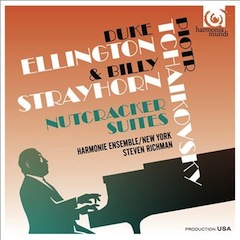 36. TCHAIKOVSKY, ELLINGTON & STRAYHORN: NUTCRACKER SUITES, Harmonie Ensemble New York, Conductor: Steven Richman (Harmonia Mundi)—In an inspired idea that tapes into all the strengths of the classical-jazz ensemble he founded in the late ‘80s, Steven Richman conducts Harmonie Ensemble New York in not one but two versions of Tchaikovsky’s The Nutcracker Suite ballet music. The first is a straight-ahead, beautifully arranged recording of the original score, as you might hear it every year at this time at the New York City Ballet’s annual George Balanchine-choreographed Nutcracker productions at Lincoln Center. The second originated with an idea suggested to Richman by former Duke Ellington trombonist and master plunger practitioner Art Baron, who pointed Richman towards the Ellington-Billy Strayhorn Nutcracker Suite released by Columbia in 1960, which at that time had not been recorded by any other artists or groups in more than 50 years. Ellington’s Nutcracker was way ahead of its time, and though it was well received upon its release it has not occupied a prominent place in Duke’s catalogue as time has passed—it wasn’t even issued on CD by Columbia until 2008, when it appeared on Three Suites along with Duke’s interpretation of Grieg’s Peer Gynt Suites 1& 2 and his and Strayhorn’s Sweet Thursday. Follow this link to the Deep Roots review of Tchaikovsky, Ellington & Strayhorn: Nutcracker Suites.
36. TCHAIKOVSKY, ELLINGTON & STRAYHORN: NUTCRACKER SUITES, Harmonie Ensemble New York, Conductor: Steven Richman (Harmonia Mundi)—In an inspired idea that tapes into all the strengths of the classical-jazz ensemble he founded in the late ‘80s, Steven Richman conducts Harmonie Ensemble New York in not one but two versions of Tchaikovsky’s The Nutcracker Suite ballet music. The first is a straight-ahead, beautifully arranged recording of the original score, as you might hear it every year at this time at the New York City Ballet’s annual George Balanchine-choreographed Nutcracker productions at Lincoln Center. The second originated with an idea suggested to Richman by former Duke Ellington trombonist and master plunger practitioner Art Baron, who pointed Richman towards the Ellington-Billy Strayhorn Nutcracker Suite released by Columbia in 1960, which at that time had not been recorded by any other artists or groups in more than 50 years. Ellington’s Nutcracker was way ahead of its time, and though it was well received upon its release it has not occupied a prominent place in Duke’s catalogue as time has passed—it wasn’t even issued on CD by Columbia until 2008, when it appeared on Three Suites along with Duke’s interpretation of Grieg’s Peer Gynt Suites 1& 2 and his and Strayhorn’s Sweet Thursday. Follow this link to the Deep Roots review of Tchaikovsky, Ellington & Strayhorn: Nutcracker Suites.
The Duke Ellington-Billy Strayhorn treatment of Tchaikovsky’s Nutcracker ‘Overture’ by Harmonie Ensemble New York as conducted by Steve Richman
 37. DEAR SISTER, Claire Lynch (Compass Records)
37. DEAR SISTER, Claire Lynch (Compass Records)
Where are the songs of Spring? Ay, where are they?
Think not of them, thou hast thy music too.–
So wondered John Keats when he wrote the final section of his now-celebrated poem “To Autumn” on September 19, 1819. Although Claire Lynch’s exceptional Compass label debut, Dear Sister, was released at the end of May, at the height of Spring, it has the reflective, contemplative feel of an autumnal missive. Desire and despair are on seemingly equal footing here, and in Lynch’s plaintive mountain tones melancholy and contentment are kissin’ cousins. Attribute this mood to Lynch herself. With this particular batch of originals and covers, her legendary vocal restraint is the perfect tack for keeping listeners off-balance and engaged… Follow this link to the Deep Roots review of Dear Sister.
Official video for Claire Lynch’s ‘Dear Sister,’ written by Claire Lynch and Louisa Branscomb and based on actual Civil War correspondence to a sister in Alabama as chronicled by Frank Chappell in his book Dear Sister: Civil Letters to a Sister in Alabama
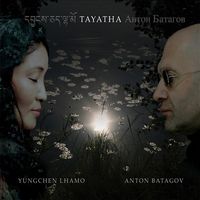 38. TAYATHA, Anton Bagatov and Yungchen Uhamo (Cantaloupe Records)–As the snow drifted down, covering New York City and its environs in a foot-deep blanket of white, classically trained pianist and post-minimalist composer Anton Batagov put his fingers to the keys. “I had not a single note on paper. No files, nothing,” he remembers. He had come together with Tibetan singer Yungchen Lhamo, whose flowing voice unfurls melodies that shimmer with profound awareness of both her native Tibetan culture and her Buddhist faith. “I said you play something, if you feel like it. If not, it’s okay,” Lhamo recalls. “Then we found the common sense of offering—not just making or manufacturing something.” Though ostensibly from two different cultural and musical worlds, the two musicians found common ground in a meditative and wide-open musical dialogue. Tayatha is the striking chronicle of their encounter, ripe with Batagov’s restrained yet sure-footed playing, and Lhamo’s delicate yet powerful voice. Referencing their shared practice of Buddhism and their shared belief in music’s power to shift the world, Batagov and Lhamo demonstrate the irrelevance of cultural boundaries in their deep, focused response to each other’s music. Follow this link to “Enlightened Moodism” the Borders Crossing feature in Deep Roots on Anton Bagatov and Yungchen Uhamo and the making of Tayatha.
38. TAYATHA, Anton Bagatov and Yungchen Uhamo (Cantaloupe Records)–As the snow drifted down, covering New York City and its environs in a foot-deep blanket of white, classically trained pianist and post-minimalist composer Anton Batagov put his fingers to the keys. “I had not a single note on paper. No files, nothing,” he remembers. He had come together with Tibetan singer Yungchen Lhamo, whose flowing voice unfurls melodies that shimmer with profound awareness of both her native Tibetan culture and her Buddhist faith. “I said you play something, if you feel like it. If not, it’s okay,” Lhamo recalls. “Then we found the common sense of offering—not just making or manufacturing something.” Though ostensibly from two different cultural and musical worlds, the two musicians found common ground in a meditative and wide-open musical dialogue. Tayatha is the striking chronicle of their encounter, ripe with Batagov’s restrained yet sure-footed playing, and Lhamo’s delicate yet powerful voice. Referencing their shared practice of Buddhism and their shared belief in music’s power to shift the world, Batagov and Lhamo demonstrate the irrelevance of cultural boundaries in their deep, focused response to each other’s music. Follow this link to “Enlightened Moodism” the Borders Crossing feature in Deep Roots on Anton Bagatov and Yungchen Uhamo and the making of Tayatha.
‘Good Times Will Come,’ Yungchen Lhamo & Anton Batagov, from Tayatha
 39. RENDEZVOUS IN RHYTHM, Hot Club of Cowtown (Gold Strike Records)– The Hot Club of Cowtown’s Rendezvous in Rhythm is the band’s first full-on salute to the gypsy jazz and hot swing of Django-era Paris and is comprised of the band’s distinctive approach to 14 tunes associated with Reinhardt and Grappelli’s Quintette du Hot Club de France. When it comes to making the most of what they’ve got, HCOC is hard to beat. They make this abundantly clear on the first number, “Dark Eyes/’Ochi Chornye’”–a red-hot instrumental version of a song written by Ukrainian poet and author Yevhen Hrebinka, first published in 1843, and recorded by Django no less than three times under the French title “Les yeux noirs.” So much for the history. This cut is dazzling in all its components as it builds inexorably to a frantic pace slightly before the halfway mark. Smith starts it with a fleet series of runs on the guitar as the tension builds; James comes in with a high-pitched chirping, hummingbird-like sound on the fiddle that doesn’t sound like it could have been produced by anything but a machine; after her virtuoso display of texture and tone, in comes Irwin with a delirious, dizzying solo, the wildest clicking and clacking you can imagine being produced on the instrument. Follow this link to the Deep Roots review of Rendezvous in Rhythm.
39. RENDEZVOUS IN RHYTHM, Hot Club of Cowtown (Gold Strike Records)– The Hot Club of Cowtown’s Rendezvous in Rhythm is the band’s first full-on salute to the gypsy jazz and hot swing of Django-era Paris and is comprised of the band’s distinctive approach to 14 tunes associated with Reinhardt and Grappelli’s Quintette du Hot Club de France. When it comes to making the most of what they’ve got, HCOC is hard to beat. They make this abundantly clear on the first number, “Dark Eyes/’Ochi Chornye’”–a red-hot instrumental version of a song written by Ukrainian poet and author Yevhen Hrebinka, first published in 1843, and recorded by Django no less than three times under the French title “Les yeux noirs.” So much for the history. This cut is dazzling in all its components as it builds inexorably to a frantic pace slightly before the halfway mark. Smith starts it with a fleet series of runs on the guitar as the tension builds; James comes in with a high-pitched chirping, hummingbird-like sound on the fiddle that doesn’t sound like it could have been produced by anything but a machine; after her virtuoso display of texture and tone, in comes Irwin with a delirious, dizzying solo, the wildest clicking and clacking you can imagine being produced on the instrument. Follow this link to the Deep Roots review of Rendezvous in Rhythm.
From its new album Rendezvous with Rhythm, the band’s first full-on salute to the gypsy jazz and hot swing of Django-era Paris, the Hot Club of Cowtown performs ‘Dark Eyes/’Ochi Chornye’.’ Elana James, fiddle; Whit Smith, guitar; Jake Erwin, bass, at the Armadillo Christmas Bazaar, Austin, TX, December 19, 2012.
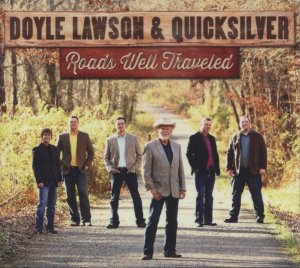 40. ROADS WELL TRAVELED, Doyle Lawson & Quicksilver (Mountain Home Music Company)– Doyle Lawson is marking his fiftieth year as a professional musician on his chronicle of love in many guises, Roads Well Traveled, with the support of one his finest Quicksilver lineups. Though it has plenty of sunny moments and jubilant spirits, Doyle Lawson’s Roads Well Traveled is as emotional an album as he has ever cut with any iteration of Quicksilver. Even though the album opener, a homesick blues called “Dixie Road,” has a frisky drive about it, the close-knit harmony vocals, anchored by Josh Swift’s rumbling bass, have a strong, affecting punch to them, common to the most heartfelt singing and with decided gospel overtones. The songs come from various top-drawer writers–Harley Allen, Bill Anderson-Steve Wariner, Carl Jackson, Jim & Jesse, Doyle himself, et al.–and tell stories centered on love. Follow this link to the Deep Roots review of Roads Well Traveled.
40. ROADS WELL TRAVELED, Doyle Lawson & Quicksilver (Mountain Home Music Company)– Doyle Lawson is marking his fiftieth year as a professional musician on his chronicle of love in many guises, Roads Well Traveled, with the support of one his finest Quicksilver lineups. Though it has plenty of sunny moments and jubilant spirits, Doyle Lawson’s Roads Well Traveled is as emotional an album as he has ever cut with any iteration of Quicksilver. Even though the album opener, a homesick blues called “Dixie Road,” has a frisky drive about it, the close-knit harmony vocals, anchored by Josh Swift’s rumbling bass, have a strong, affecting punch to them, common to the most heartfelt singing and with decided gospel overtones. The songs come from various top-drawer writers–Harley Allen, Bill Anderson-Steve Wariner, Carl Jackson, Jim & Jesse, Doyle himself, et al.–and tell stories centered on love. Follow this link to the Deep Roots review of Roads Well Traveled.
Doyle Lawson & Quicksilver, ‘Dixie Road,’ a live performance of the first track on the band’s new album, Roads Well Traveled. Video shot by Sherri George, Clay City, KY, March 9, 2013.
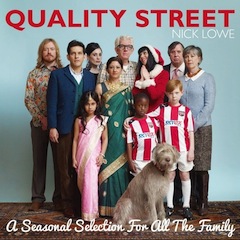 41. QUALITY STREET: A Seasonal Selection For All The Family, Nick Lowe (Yep Roc)– Nick Lowe might not immediately spring to mind as an artist you’d expect to find releasing a Christmas album—he can, after all, come off as curmudgeonly and unsentimental, much closer in spirit to Ebenezer Scrooge than to Bob Cratchit. But when his new label home, Yep Roc, suggested a holiday project, he took it under advisement and shortly thereafter bought in. “Over the course of the afternoon of that day I started examining my feelings and said, well, wait a minute,” he told Huffington Post’s David Bauder. “This could be a great opportunity to do something that, if not standing a chance of being really good, it might at least be able to work on more than one level. So I changed my mind.” The result, Quality Street, fulfills his vision, and comes complete with a subtitle that might strike some fans as being quintessentially snarky in a Nick Lowe kind of way but is in fact completely sincere. He sends that message without delay, on a driving rockabilly treatment of the gospel chestnut “Children Go Where I Send Thee,” a rousing workout that pulsates with the intensity of the best of his old band Rockpile’s recorded moments and features a deeply committed, intensely rhythmic Lowe vocal. From there he moves on to some familiar seasonal turf, adds a few new original tunes to the program, covers some lesser known contemporary tunes and generally succeeds at making it all work “on more than one level.” Follow this link to the Deep Roots review of Quality Street: A Seasonal Selection For All the Family.
41. QUALITY STREET: A Seasonal Selection For All The Family, Nick Lowe (Yep Roc)– Nick Lowe might not immediately spring to mind as an artist you’d expect to find releasing a Christmas album—he can, after all, come off as curmudgeonly and unsentimental, much closer in spirit to Ebenezer Scrooge than to Bob Cratchit. But when his new label home, Yep Roc, suggested a holiday project, he took it under advisement and shortly thereafter bought in. “Over the course of the afternoon of that day I started examining my feelings and said, well, wait a minute,” he told Huffington Post’s David Bauder. “This could be a great opportunity to do something that, if not standing a chance of being really good, it might at least be able to work on more than one level. So I changed my mind.” The result, Quality Street, fulfills his vision, and comes complete with a subtitle that might strike some fans as being quintessentially snarky in a Nick Lowe kind of way but is in fact completely sincere. He sends that message without delay, on a driving rockabilly treatment of the gospel chestnut “Children Go Where I Send Thee,” a rousing workout that pulsates with the intensity of the best of his old band Rockpile’s recorded moments and features a deeply committed, intensely rhythmic Lowe vocal. From there he moves on to some familiar seasonal turf, adds a few new original tunes to the program, covers some lesser known contemporary tunes and generally succeeds at making it all work “on more than one level.” Follow this link to the Deep Roots review of Quality Street: A Seasonal Selection For All the Family.
A sampler of Nick Lowe’s Quality Street: A Seasonal Selection For All The Family
 42. THE NEW YORK RAGS, David Chesky (Chesky Records)– “It was on the train, with its steely rhythms, its rattle-ty bang, that is so often so stimulating to a composer–I frequently hear music in the very heart of the noise…” So said George Gershwin in a 1931 interview with his biographer, Isaac Goldberg, in discussing the genesis of his monumental “Rhapsody in Blue.” David Chesky–upper west side New York resident, virtuoso pianist, gifted composer–also hears music in the very heart of the noise of the place he calls home. The latest and most impressive manifestation of that impulse is his delightful new album, The New York Rags. In 41-and-a-half dazzling minutes, Chesky introduces a new-fangled ragtime that both respects the traditional foundation constructed by Scott Joplin-Joseph Lamb-James Scott at the turn of the 20th Century and enlarged upon by the likes of Jelly Roll Morton in the ‘20s and ‘30s, but also takes it a few steps beyond what latter-day revivalists such as Joshua Rifkin and others have brought to the style since the ‘70s. Bill Milkowski’s astute liner notes succinctly summarize the complexity of Chesky’s fresh take on ragtime: “Chesky’s series of 18 modern rags, inspired by life in the bustling and always intense metropolis that he has called home since 1974, seems to owe as much to Henry Cowell’s and Charles Ives’ use of dissonance, Elliott Carter’s atonalism, Colin Nancarrow’s experimental piano rolls and Cecil Taylor’s whirlwind free jazz as they do to Joplin’s ragtime classics.” Follow this link to the Deep Roots review of The New York Rags.
42. THE NEW YORK RAGS, David Chesky (Chesky Records)– “It was on the train, with its steely rhythms, its rattle-ty bang, that is so often so stimulating to a composer–I frequently hear music in the very heart of the noise…” So said George Gershwin in a 1931 interview with his biographer, Isaac Goldberg, in discussing the genesis of his monumental “Rhapsody in Blue.” David Chesky–upper west side New York resident, virtuoso pianist, gifted composer–also hears music in the very heart of the noise of the place he calls home. The latest and most impressive manifestation of that impulse is his delightful new album, The New York Rags. In 41-and-a-half dazzling minutes, Chesky introduces a new-fangled ragtime that both respects the traditional foundation constructed by Scott Joplin-Joseph Lamb-James Scott at the turn of the 20th Century and enlarged upon by the likes of Jelly Roll Morton in the ‘20s and ‘30s, but also takes it a few steps beyond what latter-day revivalists such as Joshua Rifkin and others have brought to the style since the ‘70s. Bill Milkowski’s astute liner notes succinctly summarize the complexity of Chesky’s fresh take on ragtime: “Chesky’s series of 18 modern rags, inspired by life in the bustling and always intense metropolis that he has called home since 1974, seems to owe as much to Henry Cowell’s and Charles Ives’ use of dissonance, Elliott Carter’s atonalism, Colin Nancarrow’s experimental piano rolls and Cecil Taylor’s whirlwind free jazz as they do to Joplin’s ragtime classics.” Follow this link to the Deep Roots review of The New York Rags.
David Chesky, ‘Kids You’re Late for School,’ from The New York Rags
 43. PIANOGRAPHY, Earle Poole Ball (Tin Tube Tunes)– When Sam Phillips introduced his newest Sun artist Jerry Lee Lewis to Carl Perkins before adding the Killer to Carl’s studio sessions, Sam told Carl, “He can beat up a damn piano.” Well, Earle Poole Ball can “beat up a damn piano,” but he’s also an uncommonly lyrical player, and at his most fanciful seems to channel Bill Evans or Vince Guaraldi, Assemble the pieces of his sound signature, though, and you understand why Johnny Cash, whom Ball accompanied on stage and record for 20 years, referred to him as the king of honky-tonk piano. Pure, unadulterated country and honky tonk is what he delivers on his revealing new album, Pianography, which turns out to be a sampler of three albums in one. Follow this link to the Deep Roots review of Earle Poole Ball’s Pianography.
43. PIANOGRAPHY, Earle Poole Ball (Tin Tube Tunes)– When Sam Phillips introduced his newest Sun artist Jerry Lee Lewis to Carl Perkins before adding the Killer to Carl’s studio sessions, Sam told Carl, “He can beat up a damn piano.” Well, Earle Poole Ball can “beat up a damn piano,” but he’s also an uncommonly lyrical player, and at his most fanciful seems to channel Bill Evans or Vince Guaraldi, Assemble the pieces of his sound signature, though, and you understand why Johnny Cash, whom Ball accompanied on stage and record for 20 years, referred to him as the king of honky-tonk piano. Pure, unadulterated country and honky tonk is what he delivers on his revealing new album, Pianography, which turns out to be a sampler of three albums in one. Follow this link to the Deep Roots review of Earle Poole Ball’s Pianography.
‘Big River,’ Earl Poole Ball, from Pianography
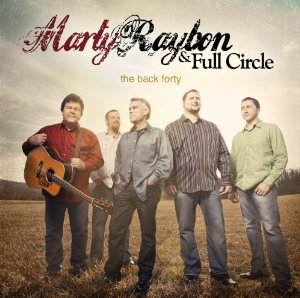 44. THE BACK FORTY, Marty Raybon & Full Circle (Rural Rhythm)– Five new Marty Raybon co-writes; superb instrumental support from his band Full Circle supplemented by a bevy of high-level stringed instrument masters; and arguably the finest singing the main man has ever laid down in a studio (recording in Muscle Shoals will do that for you). Not a bad way for Marty Raybon to begin his 40th year in the business, with one of his finest long players yet. The early buzz around The Back Forty centered on its driving opening number, “That Janie Baker,” one of three songs Raybon co-wrote with John Fountain. Featuring Tim Crouch’s frisky fiddling and tasty solos from Scott Naiper on mandolin and Chris Wade on banjo, the song lauds both the uncommon beauty and the uncommon oratorical gifts of a gal who can “bring religion to a bad man or make a good man see his wicked ways,” and thus spends her days “moving mountains.” This presumably is an update of the Dennis Linde-penned song Raybon recorded in 1993 with the band he founded, Shenandoah, a hitmaking aggregate if ever there was one. Back then, in “Janie Baker’s Love Slave” (a #15 country single), the lady in question was so desirable the singer gave up bowling, fishing and drinking; twenty years later it appears she’s as alluring as ever but is using her super powers for a greater good. Follow this link to the Deep Roots review of The Back Forty.
44. THE BACK FORTY, Marty Raybon & Full Circle (Rural Rhythm)– Five new Marty Raybon co-writes; superb instrumental support from his band Full Circle supplemented by a bevy of high-level stringed instrument masters; and arguably the finest singing the main man has ever laid down in a studio (recording in Muscle Shoals will do that for you). Not a bad way for Marty Raybon to begin his 40th year in the business, with one of his finest long players yet. The early buzz around The Back Forty centered on its driving opening number, “That Janie Baker,” one of three songs Raybon co-wrote with John Fountain. Featuring Tim Crouch’s frisky fiddling and tasty solos from Scott Naiper on mandolin and Chris Wade on banjo, the song lauds both the uncommon beauty and the uncommon oratorical gifts of a gal who can “bring religion to a bad man or make a good man see his wicked ways,” and thus spends her days “moving mountains.” This presumably is an update of the Dennis Linde-penned song Raybon recorded in 1993 with the band he founded, Shenandoah, a hitmaking aggregate if ever there was one. Back then, in “Janie Baker’s Love Slave” (a #15 country single), the lady in question was so desirable the singer gave up bowling, fishing and drinking; twenty years later it appears she’s as alluring as ever but is using her super powers for a greater good. Follow this link to the Deep Roots review of The Back Forty.
‘That Janie Baker,’ a live version of the driving opening number from Marty Raybon & Full Circle’s The Back Forty. The band is captured in performance in London, KY, May 20, 2016. Video posted at YouTube by Teresa Anglin.
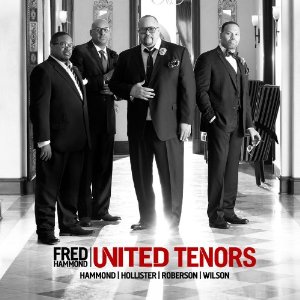 45. UNITED TENORS: HAMMOND, HOLLISTER, ROBERSON, WILSON (RCA Inspiration)— As United Tenors, Fred Hammond, Dave Hollister, Eric Roberson, and Brian Courtney Wilson offer more muscular singing than a Welsh male chorus. Whether bearing down like a freight train of sound on “Unshakeable” and “I Need You,” or sharing intimate and expressive moments on the achingly lovely ballads, “I’m in the Midst” and “I’m Reminded,” the men are stone-cold genuine in their praise, worship, and love for God. Listening to the bold mid-tempo workouts on this CD, I also couldn’t help but think this is how Commissioned would sound had the group still been around in 2013. It’s clear Fred Hammond had a hand in writing all of the songs. While the public has focused on the more flamboyant artists pushing the gospel envelope, Hammond has been quietly innovating in songwriting—-his “God, Love, and Romance” proved he can write a heartfelt love song to Jesus with the soulful sensibility of Babyface. For example, on United Tenors, Hammond and co-author Harold Martin offer “That’s the Only Way to Love,” a ballad about the unifying elements of love. Follow this link to gospel editor Bob Marovich’s review of United Tenors.
45. UNITED TENORS: HAMMOND, HOLLISTER, ROBERSON, WILSON (RCA Inspiration)— As United Tenors, Fred Hammond, Dave Hollister, Eric Roberson, and Brian Courtney Wilson offer more muscular singing than a Welsh male chorus. Whether bearing down like a freight train of sound on “Unshakeable” and “I Need You,” or sharing intimate and expressive moments on the achingly lovely ballads, “I’m in the Midst” and “I’m Reminded,” the men are stone-cold genuine in their praise, worship, and love for God. Listening to the bold mid-tempo workouts on this CD, I also couldn’t help but think this is how Commissioned would sound had the group still been around in 2013. It’s clear Fred Hammond had a hand in writing all of the songs. While the public has focused on the more flamboyant artists pushing the gospel envelope, Hammond has been quietly innovating in songwriting—-his “God, Love, and Romance” proved he can write a heartfelt love song to Jesus with the soulful sensibility of Babyface. For example, on United Tenors, Hammond and co-author Harold Martin offer “That’s the Only Way to Love,” a ballad about the unifying elements of love. Follow this link to gospel editor Bob Marovich’s review of United Tenors.
Fred Hammond/United Tenors, ‘Never a Day’
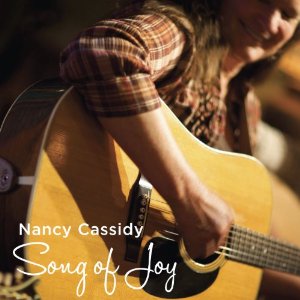 46. SONG OF JOY, Nancy Cassidy (Twitter Twatter Music)—In a note accompanying her new CD, Nancy Cassidy (who, when last heard from on her splendid 2009 album, Runaway Train, was singing tellingly of what goes on in the hearts of men and women who dare to engage life in all its complexities, romantic and otherwise) revealed, “I wrote these songs for a friend of mine who had a brain tumor…”—a revelation that hits home with added force when the first lyrics she sings, on “Every Day,” the easygoing shuffle that opens the album on a soothing note, “Every day is a miracle, that’s what it is, that’s what it is/keep searching for something better/is there something better than this, oh, oh…” Miracles, in fact, and probably not by accident, are a presence on Song of Joy, as a tangible entity we can summon with faith, both in the power of a miracle and in each other. Follow this link to the Deep Roots review of Song of Joy.
46. SONG OF JOY, Nancy Cassidy (Twitter Twatter Music)—In a note accompanying her new CD, Nancy Cassidy (who, when last heard from on her splendid 2009 album, Runaway Train, was singing tellingly of what goes on in the hearts of men and women who dare to engage life in all its complexities, romantic and otherwise) revealed, “I wrote these songs for a friend of mine who had a brain tumor…”—a revelation that hits home with added force when the first lyrics she sings, on “Every Day,” the easygoing shuffle that opens the album on a soothing note, “Every day is a miracle, that’s what it is, that’s what it is/keep searching for something better/is there something better than this, oh, oh…” Miracles, in fact, and probably not by accident, are a presence on Song of Joy, as a tangible entity we can summon with faith, both in the power of a miracle and in each other. Follow this link to the Deep Roots review of Song of Joy.
‘What a Glorious Thing,’ Nancy Cassidy, from Song of Joy
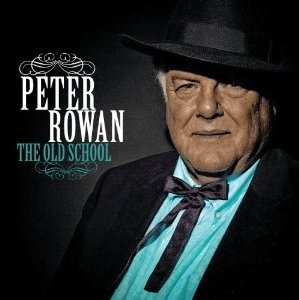 47. THE OLD SCHOOL, Peter Rowan (Compass Records)– In his tellingly titled The Old School, Peter Rowan, who has been making some of his best albums ever in the past few years, mines his own history as one of Bill Monroe’s Bluegrass Boys by assembling a multigenerational cast of players, some of whom knew and played with Monroe, others representing the continuity of the Monroe doctrine in bluegrass’s younger generation on 11 Rowan originals plus a resonant cover of the Civil Rights anthem, “O Freedom,” sung by Odetta at Martin Luther King’s march on Washington on August 28, 1963, which took place at the very moment a young, Boston-born Peter Rowan was touring around the south with Monroe and wondering if his conscience would allow him to endure much more of segregation’s brutal reality. Follow this link to the Deep Roots review of The Old School.
47. THE OLD SCHOOL, Peter Rowan (Compass Records)– In his tellingly titled The Old School, Peter Rowan, who has been making some of his best albums ever in the past few years, mines his own history as one of Bill Monroe’s Bluegrass Boys by assembling a multigenerational cast of players, some of whom knew and played with Monroe, others representing the continuity of the Monroe doctrine in bluegrass’s younger generation on 11 Rowan originals plus a resonant cover of the Civil Rights anthem, “O Freedom,” sung by Odetta at Martin Luther King’s march on Washington on August 28, 1963, which took place at the very moment a young, Boston-born Peter Rowan was touring around the south with Monroe and wondering if his conscience would allow him to endure much more of segregation’s brutal reality. Follow this link to the Deep Roots review of The Old School.
[spacer height=”20px”]
Appearing at Music City Roots, Loveless Café Barn in Nashville on April 24, 2013, Peter Rowan discusses the backstory of his new album, The Old School, and, following an introduction by Jim Lauderdale, performs his loving tribute to Doc Watson, ‘Doc Watson Morning,’ from the CD.
 48. AVALON, Rory Block (Stony Plain)– When engaging the music of Mississippi John Hurt on this, the fourth album in her Mentor Series, Rory Block entertained no illusions about what she was getting into. In her liner notes she writes: “…the challenge of creating a proper tribute is far greater than anticipated. Every country blues master I can think of put something extraordinary, ethereal, spiritual and so powerful into their playing as to make it almost impossible to reproduce. Many worthy artists have covered these songs, but when you examine the source, you understand more fully the level of greatness that was in the original versions—greatness that is also almost impossible to define. But let me try by saying that true character, charisma, drive and soulfulness are some of the essential ingredients. So how will we manage? With devotion, respect, reverence, and with energy—with extra ‘oomph’—lest we be weak.” On Avalon she proceeds to do exactly as she said she would, bringing that extra “oomph” but with devotion, respect, and reverence. This, like her other Mentor Series albums, isn’t an attempt to emulate the artists she honors but rather to honor their legacies, and their influence on her, by finding her own place in their songs, which in turn has the effect of underscoring the timeless nature of these tunes to speak to the human condition in their own time and beyond. Follow this link to the Deep Roots review of Avalon.
48. AVALON, Rory Block (Stony Plain)– When engaging the music of Mississippi John Hurt on this, the fourth album in her Mentor Series, Rory Block entertained no illusions about what she was getting into. In her liner notes she writes: “…the challenge of creating a proper tribute is far greater than anticipated. Every country blues master I can think of put something extraordinary, ethereal, spiritual and so powerful into their playing as to make it almost impossible to reproduce. Many worthy artists have covered these songs, but when you examine the source, you understand more fully the level of greatness that was in the original versions—greatness that is also almost impossible to define. But let me try by saying that true character, charisma, drive and soulfulness are some of the essential ingredients. So how will we manage? With devotion, respect, reverence, and with energy—with extra ‘oomph’—lest we be weak.” On Avalon she proceeds to do exactly as she said she would, bringing that extra “oomph” but with devotion, respect, and reverence. This, like her other Mentor Series albums, isn’t an attempt to emulate the artists she honors but rather to honor their legacies, and their influence on her, by finding her own place in their songs, which in turn has the effect of underscoring the timeless nature of these tunes to speak to the human condition in their own time and beyond. Follow this link to the Deep Roots review of Avalon.
‘Louis Collins,’ Rory Block, from Avalon: A Tribute to Mississippi John Hurt
 49. SEEDS AND STEMS, Bill Kirchen (Proper Records)– “Get outta my way you small town clowns/this country boy, he’s come to town” So begins stellar guitarist-singer-songwriter Bill Kirchen’s fine new album, Seeds and Stems, a collection of revisited Kirchen classics and new originals. In fact, the above lyric comes from “Too Much Fun,” one of the aforementioned classics dating back to the artist’s fruitful tenure as a founding member of trailblazing country-rockers Commander Cody and His Lost Planet Airmen. Here, backed by his own formidable Too Much Fun band (bassist Maurice Cridlin and drummer/percussionist Jack O’Dell, with a handful of additional musicians sitting in here and there), Kirchen, in full Tele splendor, adds a little extra je ne sais quoi to give the familiar favorites fresh bite, drive and soul and thereby make them new again. “Too Much Fun” sounds even rowdier in its 2013 incarnation as the band romps through its tale of a free spirit who meets all sorts of resistance to his antics–especially when driving a stolen car–and winds up behind bars “for having too much fun.” Seeds and Stems being something of a career overview, its eclectic repertoire is hardly surprising. Follow this link to the Deep Roots review of Seeds and Stems.
49. SEEDS AND STEMS, Bill Kirchen (Proper Records)– “Get outta my way you small town clowns/this country boy, he’s come to town” So begins stellar guitarist-singer-songwriter Bill Kirchen’s fine new album, Seeds and Stems, a collection of revisited Kirchen classics and new originals. In fact, the above lyric comes from “Too Much Fun,” one of the aforementioned classics dating back to the artist’s fruitful tenure as a founding member of trailblazing country-rockers Commander Cody and His Lost Planet Airmen. Here, backed by his own formidable Too Much Fun band (bassist Maurice Cridlin and drummer/percussionist Jack O’Dell, with a handful of additional musicians sitting in here and there), Kirchen, in full Tele splendor, adds a little extra je ne sais quoi to give the familiar favorites fresh bite, drive and soul and thereby make them new again. “Too Much Fun” sounds even rowdier in its 2013 incarnation as the band romps through its tale of a free spirit who meets all sorts of resistance to his antics–especially when driving a stolen car–and winds up behind bars “for having too much fun.” Seeds and Stems being something of a career overview, its eclectic repertoire is hardly surprising. Follow this link to the Deep Roots review of Seeds and Stems.
Bill Kirchen, ‘Down to Seeds and Stems Again,’ live at the Turning Point, Piermont, NY, August 9, 2009
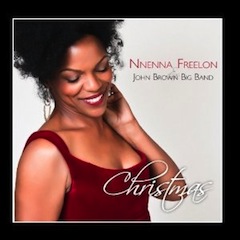 50. CHRISTMAS, Nnenna Freelon & The John Brown Big Band (Brown Boulevard Records)–This tasty jazz Christmas offering from Cambridge, Massachusetts, native Nnenna Freelon finds the six-time Grammy nominee (whose artistry extends to producing, arranging and composing) teaming up with Duke University’s jazz program director John Brown and his John Brown Big Band for some lively (and contemplative as well) tours of familiar Yuletide fare while also bringing a Christmas flair to a couple of other usually-non-seasonal tunes. In style and spirit Christmas honors Ella Fitzgerald’s wonderful secular seasonal album with her music director Frank DeVol, Ella Wishes You a Swinging Christmas. This similarity goes beyond John Brown’s terrific swinging arrangements; Ms. Freelon gives precious little ground to the great Ella when it comes to locking in with the band and swinging a lyric just so—coasting behind the rhythm here, right on the beat there, playing around with the time at points to achieve a specific effect (often playful and in the seasonal mood). She even opens the album with “Jingle Bells,” the same song Ella assays as the opening track on Swinging Christmas, except in Ms. Freelon’s hands it is not only retitled “Swing Jingle Bells” but also reimagined at a more temperate pace. Follow this link to the Deep Roots review of Christmas.
50. CHRISTMAS, Nnenna Freelon & The John Brown Big Band (Brown Boulevard Records)–This tasty jazz Christmas offering from Cambridge, Massachusetts, native Nnenna Freelon finds the six-time Grammy nominee (whose artistry extends to producing, arranging and composing) teaming up with Duke University’s jazz program director John Brown and his John Brown Big Band for some lively (and contemplative as well) tours of familiar Yuletide fare while also bringing a Christmas flair to a couple of other usually-non-seasonal tunes. In style and spirit Christmas honors Ella Fitzgerald’s wonderful secular seasonal album with her music director Frank DeVol, Ella Wishes You a Swinging Christmas. This similarity goes beyond John Brown’s terrific swinging arrangements; Ms. Freelon gives precious little ground to the great Ella when it comes to locking in with the band and swinging a lyric just so—coasting behind the rhythm here, right on the beat there, playing around with the time at points to achieve a specific effect (often playful and in the seasonal mood). She even opens the album with “Jingle Bells,” the same song Ella assays as the opening track on Swinging Christmas, except in Ms. Freelon’s hands it is not only retitled “Swing Jingle Bells” but also reimagined at a more temperate pace. Follow this link to the Deep Roots review of Christmas.
https://www.youtube.com/watch?v=oLeUhLgv1oQ
Nnenna Freelon and the John Brown Big Band, ‘Swing Jingle Bells,’ from Christmas
Follow this link to return to Part I of the 2013 Elite Half Hundred


